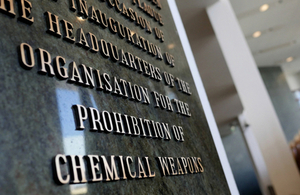Foreign Secretary calls for international action on chemical weapons
Foreign Secretary, Boris Johnson, will travel to The Hague today for a meeting with international partners on how to strengthen and protect the global ban against chemical weapon use.

A plaque commemorating the opening of OPCW Headquarters. (Credit: OPCW Flickr)
Foreign Secretary Boris Johnson addresses the House during FCO Orals
The special session of the Conference of States Parties was called for by the UK, and 10 other states, in May. The UK is calling for the international community to take action to defend the ban on chemical weapons, including asking the Organisation for the Prohibition of Chemical Weapons (OPCW) to help identify those responsible for chemical attacks in Syria, and ask the Organisation’s Director General to develop ideas for other ways of supporting the OPCW, upholding the ban on chemical weapons, and helping states implement the Convention.
Speaking ahead of the meeting, Foreign Secretary Boris Johnson said:
More than 80 countries supported the UK’s request for this special meeting of members of the OPCW. This support from the international community demonstrates a shared recognition that the global norm against chemical weapons use is being threatened, following the horrific attacks in Syria and Salisbury in recent months.
The international community came together in 1997 to outlaw the development, stockpiling and use of these vile substances through the Chemical Weapons Convention. We now owe a duty to the world to seize the opportunity that this meeting provides to uphold and strengthen that ban, so that chemical weapons are truly banished to the past.
Defending the global ban on chemical weapons
Notes to editors
- The Organisation for the Prohibition of Chemical Weapons is an intergovernmental organisation and the implementing body for the Chemical Weapons Convention, which entered into force on 29 April 1997. The OPCW has 193 member states and is based in The Hague. It has proven technical expertise and experience on chemical weapons and it currently determines whether or not a chemical attack took place in Syria, but does not attribute responsibility.
- The UK has tabled a motion to uphold the ban on chemical weapons and establish arrangements by which the OPCW can help identify those responsible for chemical attacks.
- The Special Session of the Conference of States Parties will meet on 26 – 28 June 2018
- The Foreign Secretary will make public remarks to the meeting
Further information
-
Follow the Foreign Secretary on Twitter @BorisJohnson and Facebook
-
Follow the Foreign Office on Twitter @foreignoffice and Facebook
-
Follow the Foreign Office on Instagram, YouTube and LinkedIn